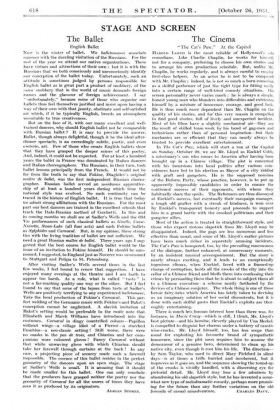STAGE AND SCREEN The Ballet
English Ballet Now is the winter of ballet. We balletomanes associate summer with the dazzling visitation of the Russians. For the rest of the year we attend our native organizations. These have virtues and attractions of their own : but it is with the Russians that we both consciously and unconsciously identify our conception of the ballet today. Unfortunately, such an attitude is sometimes judged by persons responsible for 'English ballet as in great part a product of snobbery, of the .anie snobbery that in the world of music demands foreign names and the glamour of foreign achievement. I say " unfortunately," because some of those who organize our ballets thus feel themselves justified and insist upon having a way of their own with that jaunty, obstinate and self-satisfied air which, if it be typically English, breeds an atmosphere unsuitable to true creativeness.
But on the face of it, with our many excellent and well- trained dancers, why should English ballet not be comparable with Russian ballet ? It is easy to provide the answer. Ballet, though always delightful, though it be the ideal after- 'dinner spectacle, is an exceedingly subtle, poetic, and even esoteric, art. Few of those who create English ballets show that they have grasped the deeper senses of this poetry. And, indeed, it could not be expected. For at least a hundred years the ballet in France was dominated by Italian dancers and Italian choreographers. The Russians, in their turn, took ballet lessons principally from the French. It would not be far from the truth to say that Fokine, Diaghilev's original maitre de ballet, was the first independent Russian choreo- grapher. Russian ballet served an assiduous apprentice- ship of at least a hundred years during which time the national style was evolved. No such continuity can be traced in the history of English ballet. It is true that today we admit strong affiliations with the Russians. For the most part our best dancers are trained in the excellent schools that teach the Italo-Russian method of Cecchetti. In this and in coming months we shall see at Sadler's Wells and the Old 'Vie performances of such classical ballets as Oiselle, Casse- Noisette, Swan-Lake (all four acts) and such Fokine ballets as Sylphid,es and Carnaval. But, in my opinion, these strong ties with the living tradition of ballet are not sufficient. We need a great Russian maitre de ballet. Three years ago I sug- gested that the best course for English ballet would be the issue of an invitation to Fokine himself. He should be sum- moned, I suggested, to England just as Noverre was summoned to Stuttgart and Petipa to St. Petersburg.
After visiting Sadler's Wells several times in the last few weeks, I feel bound to renew that suggestion. I have enjoyed many evenings at the theatre and I am loath to appear too harsh. As a rule, what is called " taste " is not a far-reaching quality one way or the other. But I feel *bound to say that some of the lapses from taste at Sadler's Wells are positively terrifying to any experienced balletomane. Take the local production of Fokine's Carnaval. This per- fect welding of the Germanic music with Fokine's and Bakst's conception cannot be anglicized. A slavish imitation of Bakst's setting would be preferable to the rustic note that Elizabeth and March Williams have introduced into the costumes. Carnaval in dingy countrified colours—Papillon without wings—a village idiot of a Pierrot—a starched Eusebius—a neo-classic setting ! Still worse, there were no masks in the pm de trois, and Chiarina and her com- l.:anions wore coloured gloves ! Fancy Carnaval without that white unwaving glove with which Chiarina • should take her farewell through curtains at the back ! In any case, a projecting piece of scenery made such a farewell impossible. The essence of this ballet resides in the perfect 'geometry of the dancers upon an open stage. The stage at Sadler's ' Wells is small. It is amazing that it should be Made smaller for this ballet. One can only conclude - that the producers have grasped neither the poetry nor the geometry of Carnaval for all the scores of times they have seen it as produced by its originators.
ADRIAN STOKES.






















































 Previous page
Previous page